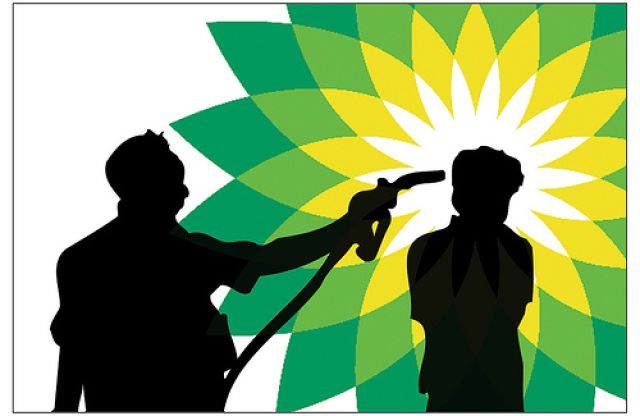
The ongoing disaster in the Gulf of Mexico caused by the April 20 explosion at the Deepwater Horizon oil rig has exposed the obscene behaviour of the world’s fourth-largest corporation, British Petroleum (BP).
Evidence has come from many sources revealing BP was aware of safety concerns, but did nothing about them.
Its lack of preparedness for this disaster — highlighted by its series of failed, makeshift repair attempts — has shown the priorities of the oil industry. Vast amounts have been spent on extraction, but next to nothing has been spent on technology to deal with highly likely spills.
From day one, BP has acted desperately — not to stop the estimated 100,000 barrels of oil a day spewing from its destroyed well — but to stop bad publicity affecting its corporate image.
BP has gone out of its way to lie about the scale of the disaster and to stop media investigations of the clean-up effort.
CNN said on June 10 that the US National Guard had been mobilised to prevent media access to oil-covered birds that had been rescued. Clean-up workers are banned from speaking to the media and are carefully watched by private security contractors.
BP’s sheer arrogance during the Gulf crisis has shocked many people in the First World. But for those in the Third World, this kind of behaviour would actually mark a step up in the oil industry’s standard practice.
Spills on the scale of the Gulf of Mexico disaster occur each year in the Nigerian delta, the British Guardian said on May 30. The difference is that, in a Third World country like Nigeria, neither the company nor government even bothers to clean it up.
BP’s approach is not unique. Nola.com said on June 29 that a survey of oil multinationals ExxonMobil, ConocoPhillips, Shell and Chevron by the US House Energy and Commerce Committee found that each of these companies’ oil-spill response plans were more or less the same as BP’s.
BP’s long history of destructive behaviour in its pursuit of profit is far from unique to the oil industry. But it is emblematic of the approach these companies take to people and the planet.
There are other, lesser known, examples of BP’s approach. BP was implicated in massacres near the Ocensa pipeline in Colombia in the 1990s, an October 1998 Guardian article said.
The company armed and mobilised government troops and paramilitary death squads against locals under the guise of protecting the pipeline against guerilla attack.
BP’s operations in places such as the Niger Delta, Kuwait, Iraq, Papua New Guinea, Algeria, Libya, Somalia, Yemen and Aden have all been accompanied by horror stories of exploitation and misery.
No country has been ravaged by BP as much as Iran. BP originated in 1902 as the Anglo-Persian Oil Company (APOC). It was set up to exploit the oil reserves of Iran.
The British government bought a 51% stake in the company in 1913 to secure fuel for its military in World War I. It took advantage of the extremely generous contract terms to make millions in profit while paying a pitiful amount in royalties.
Iranian oil workers were forced to work for tiny wages and live in squalid shantytowns.
APOC more or less controlled Iranian politics for decades, removing and installing leaders at will.
This domination came to an end in 1951 after a mass movement brought nationalist democrat Mohammad Mossadegh to power. His government nationalised the oil industry.
An outraged APOC convinced the US and Britain to organise a coup to overthrow Mossadegh and return control of the oil to multinationals. These events have affected Iran ever since, leading to the revolution in 1979.
The US and British governments are still kowtowing to the oil giant.
The June 27 British Daily Telegraph said US President Barack Obama and British Prime Minister David Cameron had agreed to bailout BP in case of significant financial damage caused by clean-up costs.
They declared in a joint statement that BP should “meet its obligations to cap the leak, clean up the damage and meet legitimate compensation claims”. But they added, “it was to both countries’ advantage for BP to remain a strong and stable company”.
British chancellor George Osborne put it more bluntly: “[BP] has many investors in the US, it is the largest oil company in the US and it is both in the US interest and the UK interest that BP has a strong future.”
In other words, the British and US governments’ are pledging to protect the interests of the company responsible for the US’s worst environmental catastrophe ever — the scale of whose damage is unknown but will be felt for generations.
As if all of this was not bad enough, the oil industry poses an even bigger threat to all of human society than the devastation wrought by the spill. Largely missing from the debate is the reality that the oil industry is not simply destructive of local environments at its points of production, but is also a major driver of climate change.
The horrible truth is the oil still pumping into the ocean is less destructive there than if it was burned and transformed into greenhouse gasses — which would contribute to the extreme danger of runaway climate change.
A “strong and stable” BP might be important for capitalism, but it is a nightmare for people and the planet.
A rational society would take this opportunity to confiscate BP’s resources to fund a transition to renewable energy. Small-scale investors could be compensated and the government could ensure retraining of affected workers into new, green industries.
Oil companies such as BP need to die so that the planet may live.